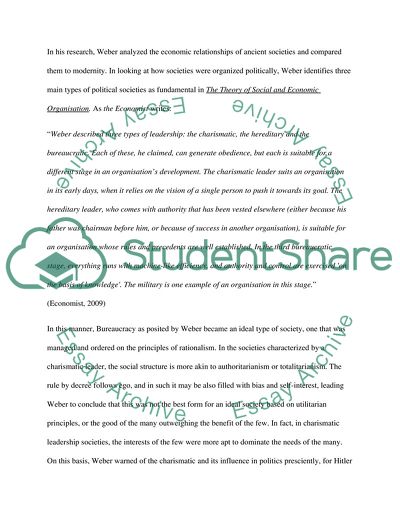Cite this document
(Describe the principal characteristics of the Weberian ideal type Research Paper, n.d.)
Describe the principal characteristics of the Weberian ideal type Research Paper. Retrieved from https://studentshare.org/literature/1747245-describe-the-principal-characteristics-of-the-weberian-ideal-type-bureaucracy-what-are-the-roles-of-power-and-authority-in-this-model-discuss-strengths-and-weaknesses-of-the-bureaucratic-form-of-organization
Describe the principal characteristics of the Weberian ideal type Research Paper. Retrieved from https://studentshare.org/literature/1747245-describe-the-principal-characteristics-of-the-weberian-ideal-type-bureaucracy-what-are-the-roles-of-power-and-authority-in-this-model-discuss-strengths-and-weaknesses-of-the-bureaucratic-form-of-organization
(Describe the Principal Characteristics of the Weberian Ideal Type Research Paper)
Describe the Principal Characteristics of the Weberian Ideal Type Research Paper. https://studentshare.org/literature/1747245-describe-the-principal-characteristics-of-the-weberian-ideal-type-bureaucracy-what-are-the-roles-of-power-and-authority-in-this-model-discuss-strengths-and-weaknesses-of-the-bureaucratic-form-of-organization.
Describe the Principal Characteristics of the Weberian Ideal Type Research Paper. https://studentshare.org/literature/1747245-describe-the-principal-characteristics-of-the-weberian-ideal-type-bureaucracy-what-are-the-roles-of-power-and-authority-in-this-model-discuss-strengths-and-weaknesses-of-the-bureaucratic-form-of-organization.
“Describe the Principal Characteristics of the Weberian Ideal Type Research Paper”, n.d. https://studentshare.org/literature/1747245-describe-the-principal-characteristics-of-the-weberian-ideal-type-bureaucracy-what-are-the-roles-of-power-and-authority-in-this-model-discuss-strengths-and-weaknesses-of-the-bureaucratic-form-of-organization.


